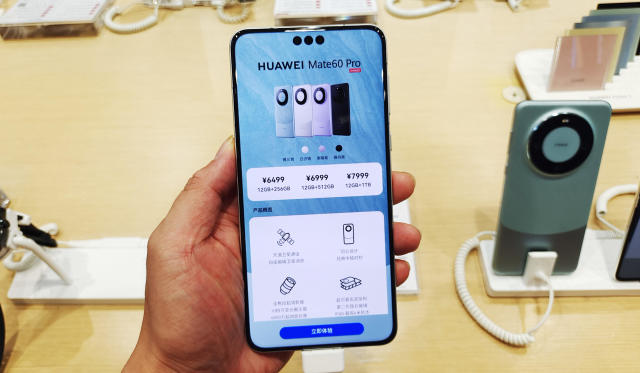The Mate 60 Pro, the newest phone from Huawei, is making waves among China’s tech enthusiasts. The new technology is causing alarm in the US, though, and the US Department of Commerce is looking into it.
The technology within the Huawei phone, which is said to have a cutting-edge 7-nanometer processor built by SMIC, China’s leading chipmaker, is of concern to American officials, according to Capital Economics. The phone has been selling well in China and boasts a chip that gives it the power and speed to compete with Apple’s iPhone.
That raises concerns about the efficacy of U.S. export rules, which have been designed to limit Huawei’s access to cutting-edge parts like cutting-edge processors. These limitations practically killed Huawei’s smartphone industry up until this point.
According to an analysis by Capital Economics, “before U.S. sanctions, the company was well on its way to becoming a global powerhouse.” “It sold more phones in Europe in 2018 than Apple did.”
According to CBS MoneyWatch, the Commerce Department is looking into the new phone.
A Commerce official stated, “We are working to obtain more information on the character and composition of the allegedly 7nm chip.” “Let’s be clear: Export controls are just one tool in the U.S. government’s toolbox to address the national security threats presented by the PRC,” the People’s Republic of China, or PRC for short.
The launch of Huawei’s new phone coincides with increased tension over geopolitical flashpoints including Taiwan’s status and the conflict in Ukraine, as well as competition between the United States and China on a number of fronts.
In an unusual diplomatic outreach, U.S. Commerce Secretary Gina Raimondo met with Chinese officials in Beijing in August to talk about mutual commercial and geopolitical interests. She highlighted the Biden administration’s intention to strengthen commercial ties with China during an appearance on “Face the Nation” last week, but she made it clear that American businesses’ tolerance is “wearing thin” when it comes to conducting business in China.
Here are some key facts regarding Huawei, the Mate 60 Pro, and how they affect Apple.
Since its founding in 1987, China’s Huawei, one of the greatest telecommunications firms in the world, has grown to employ more than 200,000 people and conduct business in 170 nations.
Due to the challenges associated with purchasing their goods in the United States, the corporation, despite its size, is largely unknown to American consumers. Huawei is allegedly a threat to national security, according to lawmakers and the FBI, and AT&T and Verizon both ceased selling Huawei devices in 2018.
The U.S. was concerned about the company’s ties to the Chinese government and worried about espionage as it saw rapid expansion. 2019 saw the United States label Huawei a security risk and place export restrictions on its sales of American technology.
Those 2019 limits, according to the Commerce Department’s statement on Friday, “knocked Huawei down and forced it to reinvent itself—at a substantial cost” to China.
The newest smartphone in Huawei’s Mate lineup is the Mate Pro 60. The new phone appears to contain a 7-nm SMIC chip, “which represents a made-in-China design and manufacturing milestone,” according to research firm TechInsights.
According to Reuters, Huawei began collecting bookings for the new phone on Friday and will deliver the products by October 9. According to speed testing, the Mate Pro 60 can download files more quickly than the best 5G phones now available on the market.
The phone also boasts a 6.82-inch OLED screen, a 5,000mAh battery, and starts at $900, according to a YouTube reviewer. It is a beast, he continued.
The release of the most recent Huawei phone coincides with Tuesday’s anticipated launch of Apple’s newest phone, the iPhone 15.
China is also one of Apple’s most significant markets, contributing around 20% of its total revenue. Along with additional restrictions from the Chinese government, which reportedly forbids government personnel from using iPhones, Apple is now facing resurgent competition from Huawei.
This week, Apple shares lost roughly $200 billion in market value as a result of the ban’s news.
However, some professionals think the worry about the consequences of a government ban is unjustified.
Regarding the latest China news, we think that, in the worst case scenario, any China government agency iPhone ban is greatly exaggerated, as we estimate that less than 500k of the 45 million iPhones will be sold in China over the course of the next 12 months. Investors were informed by Wedbush Securities analyst Dan Ives in a client note.

